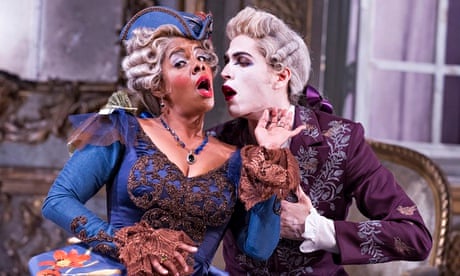Mozart has been the patron saint of Glyndebourne since the festival opened its doors 80 years ago with The Marriage of Figaro. But it has never before staged La Finta Giardiniera, premiered just before the composer turned 19. That's partly because the work wasn't unearthed in its entirety until the 1970s, and perhaps partly owing to reasons even Glyndebourne can't gloss over.
In his second assignment as the festival's music director, Robin Ticciati, draws persuasive playing from the Orchestra of the Age of Enlightenment, giving the music an easy flow and bringing out sonorous details. Still, at three hours (and even with cuts) the work is too long, and though it contains choice arias, you will wait all night for the bullseyes that Mozart hits in his mature operas.
The score lifts a clunky story, a mishmash of disguises, stock characters and socially inappropriate crushes that culminates in two out of the seven characters going mad. Last year the Buxton festival reportedly made it work, but Frederic Wake-Walker's production tries too hard to make it entertaining, and the way he sends up the characters and their baroque-opera posturing too often ends up looking arch and studenty.
Antony McDonald's set is a single rococo room that is dissolving in front of us: by the end, the characters have literally torn it apart. There is a succession of gloriously bright frocks for Nicole Heaston's spitfire Arminda, but otherwise things are gloomy. Serpetta's last aria is a what-my-mother-told-me number, which in any other staging of any other Mozart opera would have the soprano flirting outrageously with the audience. Here, Joélle Harvey delivers it from under a black veil. Ramiro – a Cherubino prototype, nicely sung by Rachel Frenkel – is some kind of 18th-century goth, Count Belfiore a wimp, the Mayor a lech in PVC pants.
Gyula Orendt acted up a comic storm as the heroine's sidekick, Nardo, and sang his recitatives, but a throat infection meant that Gavan Ring sang the rest for him stylishly from the side. Harvey, a sweet-sounding yet mettlesome soprano, makes a strong vocal impression, though not as strong as Christiane Karg, who sings Sandrina with a mixture of soft gleam and incisive edge. Yet the production makes the title character look and act anaemic, as though that wound has barely healed; how on earth has she got a job as a gardener when she barely has the strength to pot up a pansy? For curious opera-lovers, this is an opportunity to tick off a rarity in some style. But nobody is going to go home with a new favourite Mozart opera.

Comments (…)
Sign in or create your Guardian account to join the discussion